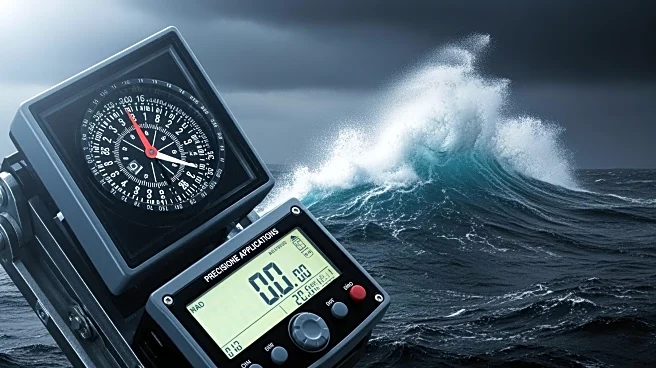What's Happening?
FLUX GmbH, a company specializing in high-performance encoders, has introduced the IND-MAX-100 Marine Grade inductive angle encoder. This new addition to the IND-MAX family is specifically designed for naval
and offshore environments, featuring a housing made from marine-grade stainless steel. The encoder is built to withstand harsh maritime conditions, offering reliable performance and precision where standard encoders may fail. Its corrosion-proof design ensures dependable operation under prolonged exposure to seawater, making it suitable for ships, offshore platforms, subsea systems, and autonomous maritime vehicles. The IND-MAX-100 expands the series' flexibility for integration across both marine and industrial applications.
Why It's Important?
The launch of the IND-MAX-100 encoder is significant for industries reliant on maritime operations, such as shipping, offshore drilling, and autonomous marine vehicles. By providing a durable and reliable solution for motion control systems in harsh environments, FLUX GmbH addresses a critical need for precision and stability in these sectors. The encoder's ability to function under extreme conditions could lead to increased efficiency and safety in maritime operations, potentially reducing maintenance costs and downtime associated with equipment failure. This advancement may also drive innovation in marine automation, supporting the development of more sophisticated autonomous systems.
What's Next?
With the introduction of the IND-MAX-100, FLUX GmbH is likely to see increased interest from industries seeking robust solutions for challenging maritime conditions. The company may explore further enhancements to the IND-MAX series, potentially expanding its applications to other sectors requiring high-performance encoders. Stakeholders in the maritime industry, including shipbuilders and offshore platform operators, may consider integrating this technology into their systems to improve operational reliability. Additionally, FLUX GmbH might engage in partnerships or collaborations to further develop and market its encoder technology.
Beyond the Headlines
The development of the IND-MAX-100 encoder highlights the growing demand for advanced sensing solutions in the maritime industry. As environmental regulations become more stringent, technologies that offer precision and durability in harsh conditions are increasingly valuable. This innovation could also influence the broader field of automation, encouraging the adoption of inductive technologies over traditional optical and capacitive methods. The encoder's success may prompt other companies to invest in similar technologies, fostering competition and technological advancement in the sector.









